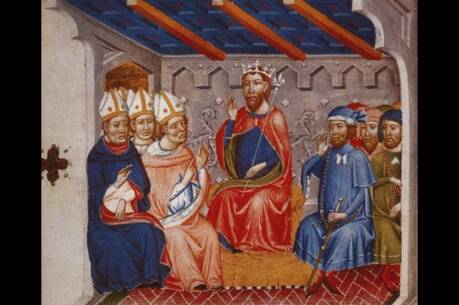We call them toddlers. They’re not yet terrific at walking, yet we’re tickled that they try. However slow and unsteady the little ones might be, we know that they’re toddling their way into tomorrow, into who they were meant to be. But should a little one raise its arms towards us, it will be lifted into our own. We want our toddlers to walk, yet we’re always at their side should they signal.
To call God “holy” is to recognize that God is utterly unique and self-sufficient. Pseudo-Dionysius, a much studied early Christian mystic, wrote, “In my way of speaking, holiness is freedom from all defilement. It is a purity that is total and is utterly untainted.”
To call God creator acknowledges who we are. All that we are is a gift, one that springs from the source of all giving. All things created carry a basic complexity. We are but did not need to be. We’re slung between nothingness and everything. We’re always becoming, though at any moment we might cease to be.
Being complex, how do we imitate the one who is simple, who simply is?
In contrast, God is simple. God is what must be. God does not change, does not become anything. Pseudo-Dionysius wrote, “Since the Cause of all things is himself overflowing with them in one transcendent excess of all, he is called ‘Holy of Holies.’” God is what gives itself to us. God is “that generous giving of self for the divinization of whatever is being returned to it.” Ponder that!
Being complex, how do we imitate the one who is simple, who simply is? How does a toddler mimic a runner? What does it mean to be perfect as our heavenly Father is perfect?
We imitate God when we give. God gives us existence so that we might return the gift, to each other and to God. Yet isn’t it odd, really, to think of giving ourselves to God? What would the all holy, the all-sufficient, want of our prayers, our small acts of asceticism and devotion?
That we should beg of God makes sense. Can we do any less? God is the source; we stand in need. That we should think to offer thanksgiving and worship to God is what should astound us. What does God want of our adoration and our asceticism, the things we embrace or forego for the love of God? Yet Saint Paul call us holy, living temples, where sacrifice and adoration are offered.
What happens when we worship? When we consciously come into God’s presence? What happens when we fast, get down on our knees, or seek out the Blessed Sacrament?
Remember the raised arms of a toddler? That’s what happens. If we give the signal—our readiness, our openness—God lifts us up. We’re supposed to walk on our own; that is God’s great gift to us. But we are never supposed to walk alone. That’s something that we choose for ourselves when we forget, when we fail to raise up our arms.
Acts of prayer and asceticism are such small things in themselves, yet through them we signal our openness, our need for the Father of Jesus. Like the toddlers we are, we raise our arms. And that’s all we need to do. God’s arms will be there.
Readings: Leviticus 19: 1-2, 17-18 1 Corinthians 3: 16-23 Matthew 5: 38-48










